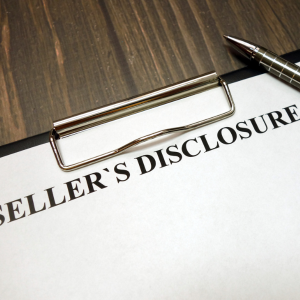
Selling Your Home in Texas: What You Must Disclose to Buyers
When selling a house in Texas, it’s important to know what you must disclose to buyers to make the sale go smoothly. Texas law requires sellers to give a detailed Seller’s Disclosure Notice, which outlines the condition of the property and any known problems. This page will help you understand what you need to disclose, such as issues with the foundation, past repairs, and environmental hazards. By clearly sharing this information, sellers can create trust with buyers and help ensure a successful sale. Let’s look at the details of seller disclosures in Texas.
What Do Texas Seller’s Disclosures Entail, and Why Are They Required?
Selling a property in Texas requires knowledge of seller disclosure nuances. Seller disclosure ensures buyer-seller transparency in home sales. Texas sellers must use a seller’s disclosure notice to disclose property issues. More than a formality, this document provides crucial information that may influence the buyer’s purchase decision. A seller’s disclosure protects both parties by listing all known house defects and potential issues.

It’s unclear why sellers must disclose. Sellers must disclose material defects that affect property value or desirability. These include structural, repair, plumbing, electrical, roofing, and other issues. Sellers must accurately complete the disclosure form to avoid lawsuits or rescinded sales. Complete seller disclosure is both moral and legal.
The Texas seller’s disclosure form is a comprehensive checklist for sellers. The document covers everything a potential buyer needs to know about the property. Sellers should disclose water damage, termite infestations, and nearby environmental hazards. This thorough approach increases transparency, enabling buyers to make informed decisions.
Texas sellers must disclose such information—why? Beyond legal implications, seller disclosure promotes honesty and trust in real estate transactions. Buyers rely on these disclosures to understand their investment. Failure to disclose can cost the seller money and reputation. Being upfront with a seller’s disclosure reduces misunderstandings and last-minute negotiations, speeding up the transaction.
Seller disclosures in Texas are crucial. They ensure legal compliance, trust, and smooth transactions. In the complex world of real estate, sellers should remember that a well-prepared seller’s disclosure can prevent future disputes. Sellers fulfill their duties and ensure a fair transaction by being upfront about their property’s condition.
Required Elements in Texas Property Sales Disclosures

Understanding the seller’s disclosure requirements is crucial for a successful home sale in Texas. In real estate, especially in Texas, complete and truthful disclosures can prevent litigation. Sellers must provide a Seller’s Disclosure Notice, which covers property details that may impact a buyer’s decision. This disclosure document gives prospective buyers a complete picture of the property’s condition and any issues you recognize as the homeowner. Texas sellers must disclose structural, plumbing, and electrical issues. Texas property laws require sellers to disclose such conditions to help buyers make informed decisions.
Disclosure of termite treatment or infestation, water damage, asbestos, or lead-based paint on the property is also required. Manage these elements clearly and openly to reduce the risk of sales falling through due to unmet expectations or undisclosed issues causing distrust. Sellers must also disclose legal issues regarding property to buyers. This includes property boundary lawsuits that may affect buyers’ ownership rights. In Texas, transparency is key, so full disclosures support an ethical real estate process and build trust between seller and buyer. Compliance with disclosure requirements is essential for additions or renovations without permits.
This information should be disclosed upfront to avoid buyer issues after the sale. Providing all required disclosures can greatly impact your home’s sale. Incomplete or inaccurate seller disclosures may result in legal action and damage your reputation. Thus, when selling a Texas property, being diligent about disclosure obligations can save time, avoid conflicts, and maximize your sale. Texas home sellers should check every detail when preparing their homes for sale, from disclosing specific defects to ensuring detailed property disclosures.
What Are Texas Sellers Required to Disclose About Their House?
Understanding what Texas sellers must disclose is crucial when selling a home. A thorough seller’s disclosure gives buyers important house condition information, boosting trust. Texas sellers must follow the Texas Property Code, which requires full transparency. What must Texas home sellers disclose? A wide range of details must be disclosed to ensure the buyer notices everything about the house.

A seller’s disclosure must first list structural defects like foundation and roof leaks and major system issues like plumbing or electrical. These issues can significantly impact property value and safety, so Texas law requires sellers to disclose them. Texas sellers must also disclose any hazards or violations in the home. This includes environmental issues like lead-based paint if the house was built before 1978 and zoning issues that may limit the new owner’s development options.
Texas sellers must also disclose any flooding or water damage in their homes. Flooding can damage property, so this is crucial. The seller must also disclose past insurance claims related to the property’s condition. A complete seller disclosure includes information about house renovations that may have violated local building codes.
Whether the house has natural or man-made nuisances like noise or odors must also be disclosed. Seller disclosure lets sellers inform buyers of conditions that may affect their purchase decision. By following these rules, a seller streamlines the sale and reduces disputes.
Sellers must know what Texas law requires them to disclose. Seller disclosure is required in Texas for home sales and helps ensure transparency and a smoother transaction. It protects everyone and builds confidence in house sales. Disclosure is crucial in Texas real estate, and sellers must take it seriously to avoid potential consequences for not disclosing crucial information about their home.
Issues: Do They Affect the Sale?
Texas home sellers must understand issues and how they affect the sale. Sellers must disclose property issues. What issues exist, and how do they affect sales? Let’s examine common examples. Since they affect the house’s foundation, structural issues are common. Cracked foundations or leaky roofs can hurt sales. They must be repaired and disclosed to buyers. It is important to disclose electrical, plumbing, and HVAC issues because they affect essential systems and home functionality.

Another issue can be missing or outdated renovation permits. Work done without permits must be disclosed. Failure to do so could complicate or reverse the sale. Legal issues like liens may also affect the sale. The seller must disclose the property’s debts. Nobody wants to be surprised by debts after signing the deal.
Environmental issues like lead paint, asbestos, and flood zones must be disclosed. These legal issues should be disclosed to prospective buyers because they affect safety and property value. Why must sellers disclose these details? Beyond ethical concerns, failing to disclose could have serious legal consequences if litigation arises post-sale. Neglecting to disclose relevant issues can stall the sale and result in financial penalties or extensive repairs, hurting the seller’s bottom line.
Finally, how do personal issues affect sales? Personal or legal disputes involving property must be disclosed to avoid complications. Disagreements and hidden interests can derail a deal, so it’s important to clarify. Sellers should remember that the sooner they disclose these details, the smoother the transaction. After considering all these factors, it’s clear why honesty is essential in any successful real estate deal. What was your experience? Did any of these issues substantially affect your sales? The seller should have been transparent to ensure future peace of mind.
Why Should Texas License Holders Be Open About Selling Issues?
Transparency in seller disclosure is legal but also ethical and strategic when selling a house in TX. Texas real estate requires honesty from all parties, especially licensed agents. You might wonder why license holders should be upfront about selling issues and if the downside could affect the sale. However, full disclosure can protect the seller and buyer from legal issues, making transactions easier. Texas law requires seller disclosure for licensed real estate professionals and private sellers to avoid legal issues after the sale.

Seller disclosure includes property defects and issues. Disclosure is required for structural issues, flooding, and other hazards. Texas licensees who understand real estate are responsible for transparency because non-disclosure could lead to legal issues. If you fail to inform buyers, you may face legal issues that question your integrity and professionalism.
Not only does disclosing improve the seller-buyer relationship and increase the likelihood of a successful transaction, but it also helps avoid legal issues. If buyers know what they’re buying, they’re less likely to back out due to surprises, complaints, or disillusionment. This may seem counterintuitive, but a seller’s disclosure can make the property more appealing to buyers who know all the facts upfront rather than discovering major objections later.
Texas realtors know that the market has an ethical side and legal obligations. Investors need transparency to avoid financial and emotional stress from unknown issues. Most often, the answer to “Should I disclose this?” is yes. Being upfront during selling isn’t just legal—it creates a positive real estate reputation.
Wouldn’t you want real estate buyer assurance? The commitment to full disclosure gives license holders peace of mind that they’ve done their due diligence, preventing legal issues. In short, disclose fully and openly in the spirit of ethical practice, knowing you’ve avoided legal pitfalls and have a clear conscience about selling your property.
More TX Home Seller Resources
Does Failure to Disclose Impact Seller’s Sale Outcome?
Texas property sellers must consider the consequences of failing to disclose relevant information. Failure to disclose information can hurt the seller’s sale and cause disputes that could derail the deal. Disclosures ensure buyers understand the property’s condition and ensure a fair business transaction in real estate. Without proper disclosure, estate sales can result in legal and financial liability for the seller.
If they think certain details about their property will deter buyers or lower its value, sellers may be tempted to omit them. Failure to disclose can have serious consequences. Undisclosed information can cause disputes after the sale if the buyer discovers hidden issues. A seller who fails to disclose a leaky roof or foundational issues can damage trust and lead to costly legal battles and settlements.

Seller’s failure to provide full disclosures can hurt their financial bottom line and reputation. Buyers who discover undisclosed issues can sue for compensation or to reverse the sale. This can delay the sale, increase legal fees, and cost money that could have been avoided with honesty and professionalism.
Sellers who fail to disclose can also damage their real estate business relationships. A seller known for not disclosing important property information may have trouble participating in future estate transactions, affecting their personal and professional networks. Trust and reliability are crucial in the real estate industry, and breaking them can have serious consequences.
Thus, estate sellers must make all required disclosures. They will gain credibility and streamline the transaction, ensuring a successful sale. Sellers should be transparent and honest in their real estate business. Sellers should carefully address potential issues before they become disputes during disclosures. Increasing the likelihood of a successful sale benefits both buyer and seller in the long run.
In conclusion, not disclosing crucial information when selling a house in Texas can significantly affect the outcome. Maintaining ethical business practices in real estate is key. Sellers who disclose truthfully reduce risks and improve real estate transactions.
What Every Texas Home Seller Needs to Know About Disclosures

Every Texas seller must understand and follow certain disclosures to comply with real estate laws. The Texas Property Code, which requires sellers to disclose any property issues affecting home value or buyer decision, is crucial to this process. The seller stays within the state’s real estate system’s legal framework, avoiding disputes and litigation. Seller disclosure formally describes the property’s condition and any known issues. Sellers in Texas must disclose any structural or repair issues that could affect the sale. State real estate transactions depend on the seller’s disclosure form’s transparency.
Texas sellers must disclose any property risks. Possible issues on the property include foundation, plumbing, roofing, and historical data indicating recurring issues. This helps the seller comply with real estate laws and build trust with potential buyers, making the transaction easier. Failure to disclose information in Texas can result in legal consequences that could affect the seller’s ability to sell the property. Sellers should know that state laws protect both parties. Selling disclosure forms should include all property information to avoid misunderstandings and disputes. Good faith in Texas real estate transactions requires seller disclosure transparency.
Disclosure in property law promotes full communication and reduces post-sale disagreements. The Texas Property Code’s property disclosure requirements aren’t just bureaucratic procedures; they protect the real estate market. Sellers can work with a qualified real estate professional to meet all disclosure requirements for a successful sale. Using the right disclosure forms can help sellers maximize their property’s sale and protect their interests. Knowing Texas’s disclosure requirements gives sellers confidence in their real estate efforts.
More TX Home Seller Resources
Disclosing Property Issues: A Texas Seller’s Guide

Understanding the importance of disclosing property issues can affect selling a Texas home. This Texas seller’s guide informs homeowners of what they must disclose to buyers to comply with state laws and maintain transparency. Disclosure of property issues, including water damage, structural integrity, and previous repairs, is crucial. It builds buyer trust and protects sellers from legal issues caused by not disclosing crucial information.
Texas sellers must complete a Seller’s Disclosure form. This form details all known property issues. Sellers must disclose past issues like foundation cracks, roof leaks, and pest infestations. Water-damaged properties from natural disasters or plumbing leaks should be disclosed. To avoid legal issues, sellers must verify all information.
Real estate agents recommend proper inspections before selling the house. Inspections can reveal property issues to potential buyers, making disclosure easier. If the inspection shows major repairs, sellers may need to schedule them before closing or address them in the offer terms to clarify issues. A good real estate agent can help sellers understand Texas property law obligations.
Understanding the disclosure rule is crucial. If sellers are unsure about the disclosure guidelines, they should consult a lawyer or legal entity. Consulting a lawyer can clarify agreements and seller obligations. This highlights the importance of honest and complete disclosures, preventing lawsuits or disputes if an undisclosed issue arises after the sale.
In conclusion, a Texas seller’s guide to property disclosure emphasizes accuracy and transparency. Sellers must disclose all known issues under mandatory disclosure laws. A lawyer, agent, or professional inspector helps sellers fulfill their obligations and transfer ownership without legal issues. This guidance protects sellers and promotes fair and transparent real estate transactions.
Understanding Seller’s Disclosure Requirements When Selling a House in Texas
When selling a house in Texas, it’s important to know the Seller’s Disclosure form requirements to ensure a clear and open transaction. By revealing all known issues and defects, including foundation problems, water damage, or pest infestations, you adhere to Texas law and foster trust with potential buyers. Neglecting to provide the required seller disclosures can result in legal issues. It’s advisable to consult with a real estate attorney to guarantee that you fulfill all disclosure obligations and safeguard yourself during the selling process. Transparency is crucial for a successful sale.
This information applies to Texas and its cities, including Coppell, Sherman, and Red Oak. For assistance or questions, please call us at (214) 225-3042. You can also visit our website at Southern Hills Home Buyers for more details.
Get Cash For Your Texas House Today
We buy houses in Texas without the hassle and red tape. Get your no-obligation cash offer for your home and just be done. Selling in as-is condition has never been easier.





